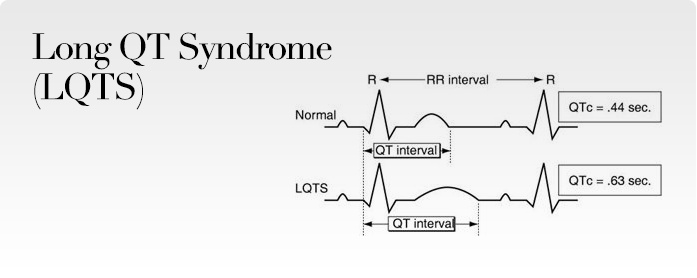
Make an appointment

Home ›
Long QT Syndrome (LQTS)
Long QT Syndrome (LQTS)
|
LQTS is a condition in which the heart’s electrical system is prone to life-threatening arrhythmias such as ventricular tachycardia (VT) or ventricular fibrillation (VF). The diagnosis is made on the ECG – a measurement called the QT interval exceeds the normal values. |
|
| LQTS may be congenital (present from birth) or acquired (due to other cause later in life). Congenital LQTS has a genetic basis and several members in the same family may be affected. Some drugs can produce LQTS. These include common antibiotics like erythromycin and ciprofloxacin, antihistamines like terfenadine and antidepressant medications like amitriptyline. A comprehensive list of drugs that can produce LQTS can be found on the internet. |
|
| Screening of family members is important in Congenital LQTS. There may have been a family history of unexplained sudden cardiac death. Sudden death during sleep or drowning cases are suspicious for the syndrome. Arrhythmias in some forms of Congenital LQTS may be triggered by stress, especially pregnancy, childbirth, or even sudden loud noises. The QT interval in some LQTS patients may be normal on some days and prolonged on others. Hence several ECGs or Holter monitoring may be needed to diagnose LQTS in borderline cases. By studying families with confirmed LQTS, many genes which cause congenital LQTS have been identified. In families where one member has been shown to have the syndrome, other family members can be screened to see if they carry the same gene and are therefore at risk for sudden cardiac death. |
|
| Patients with LQTS may present with recurrent syncope, have been diagnosed as fits or epilepsy in the past before the cause of syncope was identified to be arrhythmia, or may have been resuscitated from sudden cardiac death. |
|
| Patients with LQTS must avoid taking medications that can further prolong the QT interval. This means having to inform their family doctors and all other doctors treating them that they have the condition, so that these medications will not be erroneously prescribed. They must also avoid taking anything that will lower their blood potassium or magnesium levels, since this may cause prolongation of the QT interval. |
|
| Treatment is by implantation of an automatic implantable cardioverter-defibrillator (ICD). Drugs such as beta blockers or mexiletine have been used but they are not as effective in preventing sudden cardiac death. Stellate ganglion sympathectomy is performed when episodes of arrhythmia are frequent, leading to frequent ICD shocks. |


